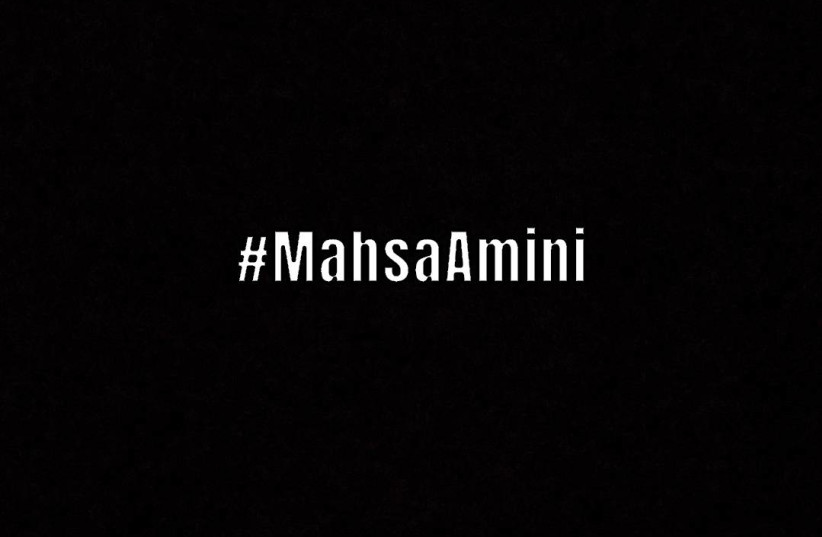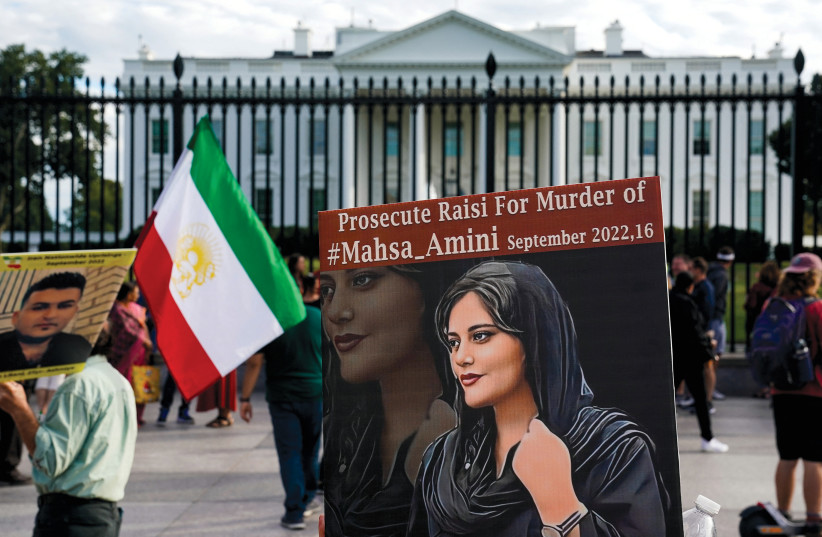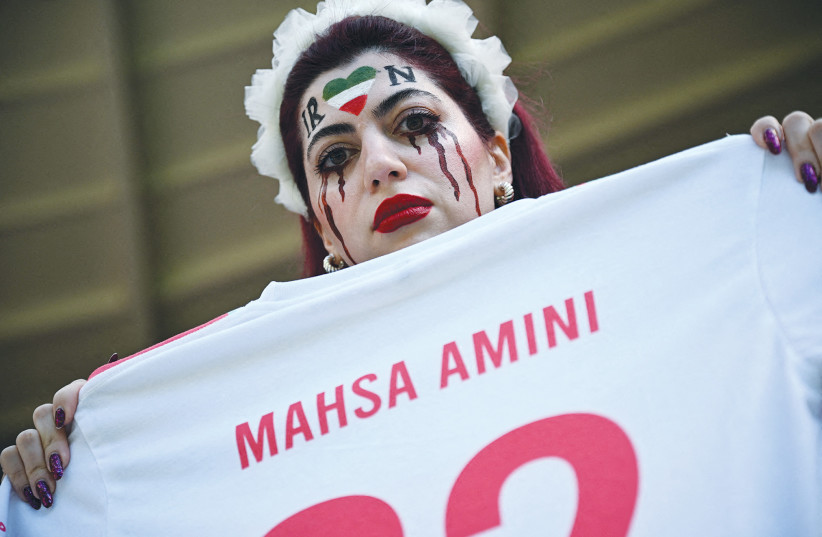Jewish singer talks to ‘Post’ about new Mahsa Amini song release
The band ‘Iraqis in Pajamas’ is releasing a new single entitled ‘#MahsaAmini’ on September 16, the anniversary of Mahsa Amini’s murder by Iranian police.
The song also features the names of some of the over 1500 protesters killed for standing up against the Iranian government. Specifically: Nika Shakarami, Hadis Najafi, Armita Abassi, Sasan Ghorbani, Mehdi Mohammadifard, Javad Rouhi, Sarina Saedi, Arshia Takdastan, Nasrin Ghader, Fereshteh Ahmadi, Minoo Majidi, Hamed Salahshoor, Nima Nouri, Saeed Yaghoubi, Gazaleh Chalavi, Setareh Tajik, Majid Kazemi, Saleh Mirhashemi and Hamidrezah Rouhu.
The murder of Amini led to widespread protests across Iran and drew international attention to the regime’s mistreatment of women.
One of the band members, Loolwa Khazzoom, explained that the story of Amini had touched her in a very personal way as her grandmother and aunt had been forced to wear a hijab under the compulsory Islamic dress code in Iraq. Khazzoom also explained that she had experienced sexual violence due to “Middle Eastern men’s obsession with women’s hair.”
 #MahsaAmini (credit: Courtesy)
#MahsaAmini (credit: Courtesy)Khazzoom, the daughter of an Iraqi Jewish refugee, has campaigned tirelessly on behalf of the women of Iran who are suffering under the regime. She has actively shared content on her social media pages, launched a fundraising campaign for United for Iran which supports Iranian protesters, and has now written a song to spread awareness.
 Iranian Americans rally outside the White House on September 24, 2022, in support of anti-regime protests in Iran following the death of Mahsa Amini. (credit: Elizabeth Frantz/Reuters)
Iranian Americans rally outside the White House on September 24, 2022, in support of anti-regime protests in Iran following the death of Mahsa Amini. (credit: Elizabeth Frantz/Reuters)In speaking with the Jerusalem Post, Khazzoom was asked, “Why do you think Amini’s story grabbed such international attention?”
“The women – and later men – of Iran were incredibly powerful on social media. I’m on Middle Eastern threads, so I got word immediately through TikTok, right after Mahsa Amini was murdered when the conversation was still underground,” Khazzoom explained.
“These women communicated their accurate prediction that the government would crack down on protests and disable the internet. “Be our voice,” they said in their videos. I actually referenced that in the song, with the lyrics, “We hear you, we see you.”
“I myself jumped into action, in response to their pleas, and I know that many others did, too, across the world. Even just forwarding every single video from Iranian protestors helped create a groundswell, never mind writing representatives and so forth. We were all guided and directed by the bold Iranian women who told us clearly what they needed. They used social media in its greatest, most powerful capacity.”
In explaining what they hope the song will accomplish, she responded, “I wrote it from the depths of my soul and heart, right after the murder, which really shook me up. I didn’t have an agenda of accomplishment. It was just a way for me to personally process what was going on and how I felt about it.”
“Music is my vehicle for healing. However, now that the song is being released, I hope it will be a rallying cry, a vehicle for people worldwide to express outrage. I hope people crank it up in their cars and on their headphones. I hope they shout out Mahsa Amin’s name, along with me, during the song, and I hope they look up the names of the protestors I recite in the song – all of whom were tortured and/or murdered while courageously standing up for women’s autonomy and freedom.
“I hope that the catchiness of the song draws in people who otherwise might not know and might not care about what’s going on. And I hope it calls them to action.”
In a message to the woman of Iran, Khazzoom said “I hear you. I see you. I love you. I am blown away by your ferocious courage. You are blazing lights in the darkness of this world. I am singing my heart out in this song, for you.”
“I hear you. I see you. I love you. I am in blown away by your ferocious courage. You are blazing lights in the darkness of this world. I am singing my heart out in this song, for you.”
Loowla Khazzoom
The life and death of Mahsa Amini
Amini lived in the Kurdish city of Saqez and died only three days after she was arrested by police, the Post reported in September. Authorities denied brutalizing the 22-year-old woman and said that the previously healthy Amini had died of heart failure.
A retracted statement from the hospital claimed that Amini had been brain-dead upon her arrival at the hospital.
Amini had been arrested for wearing trousers which apparently violated the country’s dress code which called for women to wear clothes that “promote virtue and prevent vice.”
 AN IRANIAN fan holds a jersey in memory of Mahsa Amini, inside the stadium before a World Cup soccer match between Iran and Wales, in Qatar, last November. (credit: DYLAN MARTINEZ/REUTERS)
AN IRANIAN fan holds a jersey in memory of Mahsa Amini, inside the stadium before a World Cup soccer match between Iran and Wales, in Qatar, last November. (credit: DYLAN MARTINEZ/REUTERS)About Iraqis in Pajamas
Iraqis in Pajamas is a Seattle-based indie rock band that has produced a number of socially conscious songs; including ‘Monster’ which is about domestic violence. The group has used their musical talents to showcase a number of fundraisers.
The band’s songs are written in English, Judeo-Arabic, and Hebrew. The band’s website explains that they use “an innovative blend of ancient Iraqi Jewish prayers, alternative rock, and personal storytelling about topics as varied as cancer, domestic violence, racism, mental illness, street harassment, family caregiving, and national exile.”
Despite the songs including Hebrew and Judeo-Arabic lyrics, Khazzoom is the only Jewish member of the band. When asked about this, she responded:
“Nobody is except me, and I love that. Jews tend to self-isolate, especially when we’re being very Jewy. I am a flaming Jew, and I invite anyone and everyone who wants to celebrate with me to do so, and additionally to support me in my identity and expression of my heritage. Jews throw ourselves into celebrating and supporting others, but because of rampant self-esteem issues, don’t ask or expect others to do the same for us. I do.”
“I grew up learning all the songs and prayers of my Iraqi Jewish heritage. I was raised orthodox, so this was the rhythm of my life. I was always very passionate about my heritage. My band, Iraqis in Pajamas, enables me to put my personal stamp on it – combining ancient Iraqi Jewish prayers with original alternative and punk rock music, with my own lyrics, and singing in Judeo-Arabic, Hebrew, and English. It’s all of me, all at once. I sing about personal and collective healing, and I do it loud. Quite literally.”
When asked, “What connection does your Jewish identity have with your song topics?” Khazzoom gave a deep insight into the history of the Jewish people and their historic role in fighting for justice.
“It’s deep – 2,600 years ago, the Babylonian Empire conquered Yehuda (Judah), the southern region of ancient Israel. The people of Yehuda – known as Yehudim, or Jews (that’s how we got our name), were taken as captives to Babylon, on the land of today’s Iraq, where my family remained until, ironically, they were forced to flee as refugees from modern-day Iraq. So my ancestors not only lived under ancient Persia but were liberated by it. That’s because fifty years after the Babylonian Empire conquered ancient Israel, the Persian Empire conquered the Babylonian Empire and allowed the Jews to return to rebuild Israel and even offered financial support – among other things, helping rebuild the temple. “
“I did some TikTok videos shortly after the uprising began, celebrating the rebirth of the ancient Persian warriors, rising up to reclaim their land, their autonomy, their birthright. People are so ignorant – they think Islam is indigenous to the entire Middle East and North Africa, but it’s untrue. Muslim conquerors invaded and dominated throughout the region, 1,300 years ago, subjugating the indigenous ethnic and religious groups – including Jews, Berbers, Persians, Kurds, and so on. Of course, the particulars of treatment depended on time periods and rulers, but people shy away from talking about the very real oppression under Islam.”
“Jewish women throughout the region were forced to wear the hijab. My grandmother and aunts wore the abaya, the full-body covering worn by women in Iraq, and I inherited my grandmother’s – a mass of black material. I discovered it in the attic in my early 20s. It had my initials, which initially confused me but later made sense, because I’m named after my grandmother. Before realizing what and whose it was, I thought it was an old cloak that I had but couldn’t remember. But it was too long, even at my full adult height, and I would have only been shorter years prior. It didn’t make sense until the proverbial lightbulb went off, and I put it over my head – then it fit perfectly. I actually wrote about the experience in the introduction to my book, The Flying Camel: Essays on Identity by Women of North African and Middle Eastern Jewish Heritage. I felt suffocated wearing it, and I only had it on for a few minutes, without even being in the oppressive heat of Baghdad.”
“Jewish girls and women in Iran today are forced to obey Muslim dress codes, just like any woman in Iran, or be subject to violent assault. One of the protestors I mention in the recitation of names is Armita Abassi – a Jewish girl whom Iranian police repeatedly gang-raped, and subjected to additional forms of torture when she led a demonstration.”





Comments are closed.